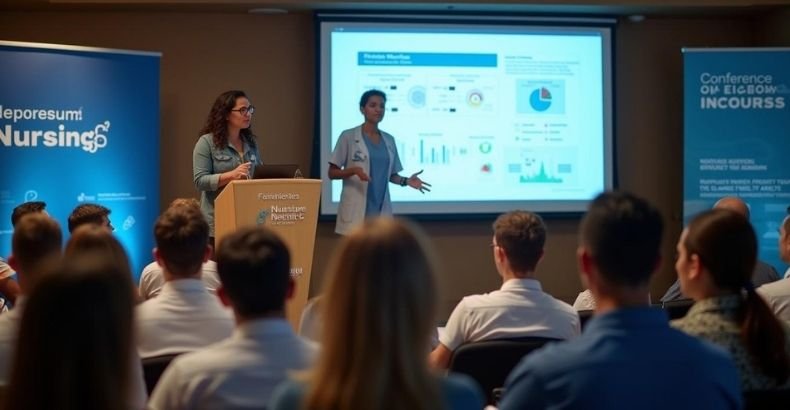Health care professionals attend nursing conferences to share knowledge, discuss innovations, and network. As the importance of these conferences grows, many might wonder: What makes a nursing conference successful?
A successful nursing conference combines diverse, relevant topics, expert speakers, and interactive sessions that engage attendees. It offers networking opportunities and provides actionable takeaways that participants can apply to their professional practice.
Do you want to explore this topic further? Continue reading to discover all the essential details about successful nursing conferences, their key elements, and how they contribute to professional growth in the nursing field.
Development of Nursing Conference Over the Year
Nursing conferences have evolved significantly over the years, reflecting the growth of the healthcare profession. Initially, these events were localized, focusing on sharing knowledge within small communities. However, as the nursing profession expanded, so did the scope of these conferences, which began addressing global healthcare challenges and advancements in nursing practices.

Today, nursing conferences are held in various countries, each offering distinctive insights and innovations. From the United States to Europe, Asia, and beyond, these events provide a platform for nurses to exchange ideas, learn from experts, and collaborate on solutions to pressing issues in patient care. Such events have become crucial to the development of nursing worldwide.
For example, the international nursing conference in Canada has become a significant event, attracting professionals eager to explore the latest research and practices. These conferences not only promote professional development but also create a sense of global unity among nursing professionals.
What Makes a Nursing Conference Successful?
A successful nursing conference is a blend of effective planning, engaging content, and meaningful participation. It provides a memorable platform for healthcare professionals to connect, learn, and inspire each other. Here are a few key factors that ensure the success of a nursing conference:

Diverse and Relevant Topics
For a nursing conference to be truly successful, it must offer a diverse array of topics that are relevant to the interests and needs of its audience. Covering current issues, innovations, and best practices in nursing helps ensure that participants are gaining fresh insights. When participants contribute their research, they help create a varied selection of subjects, making the event even more dynamic.
Excellent Quality Speakers and Presenters
Having excellent quality, respected speakers is crucial for maintaining the reliability of the conference. Speakers should be experts in their respective fields, providing practical knowledge that can be applied directly to participants’ practices. Their experiences, backed by solid research, can make attending worthwhile. When attendees know that credible presenters are involved, they are more likely to participate and engage fully.
Opportunities for Networking
The networking opportunity can significantly improve the value of any nursing conference. Participants can meet fellow nurses, industry experts, and thought leaders, forming connections that go beyond the conference itself. Whether it’s through organized sessions or informal meet-ups, connecting with others boosts the chances of finding collaborations and learning about future research contributions.
Interactive and Engaging Sessions
Sessions that engage participants rather than simply lecture them tend to be more successful. Workshops, Q&A panels, and interactive discussions encourage attendees to participate actively. By facilitating an environment where questions and experiences can be shared, the event becomes more memorable and informative for everyone present.
Well-Planned Logistics and Accessibility
A successful conference is largely dependent on its logistical arrangements. Factors such as easy accessibility, comfortable venues, and well-scheduled breaks are crucial to attendee satisfaction. A nursing conference should also ensure that every participant feels welcomed and included, which means accommodating various accessibility needs and making it easy for all to attend without facing barriers.
Opportunities for Professional Growth
Collaboration among healthcare professionals is another crucial factor in delivering quality care. Nurses often submit a research paper to a nursing conference to present works with doctors, therapists, and social workers to develop comprehensive care plans. This teamwork not only enhances patient outcomes but also elevates the overall healthcare experience. Opportunities for such collaboration frequently arise at events, where professionals come together to exchange knowledge and ideas.
Inclusion of Emerging Trends and Technologies
Focusing on emerging trends and new technologies in the nursing field can help the conference remain relevant. Including sessions that discuss innovations—such as AI in healthcare, telehealth, or new treatment protocols—helps attendees stay ahead of the curve. When participants are motivated to showcase advancements, they add unique perspectives and enhance the learning experience.
Strong Focus on Outcomes and Takeaways
Every successful conference ends with participants feeling like they have actionable takeaways. Whether it is new skills, knowledge, or contacts, ensuring there are tangible benefits from attending makes the conference worthwhile. Providing content that participants can take back and apply in real-world scenarios is essential for lasting impact.
A well-planned nursing conference is a cooperative project that benefits the community as a whole, not just a gathering. Meaningful content, structured networking, and quality interactions can turn a standard gathering into a truly impactful event for all involved.
How Do Nursing Conferences Keep Nurses Updated on Industry Changes?
To stay informed and ready for changes in the healthcare sector, nurses must attend conferences. By connecting nurses with important updates and emerging practices, conferences make sure that healthcare workers are always on top of industry developments. Below are key aspects of how conferences help nurses stay informed:
Practical Workshops for Hands-On Learning
Nurses have the opportunity to participate in practical exercises that showcase novel approaches during conference workshops. Through practice-based learning, attendees gain experience that improves their skills. Participating in workshops allows nurses to explore techniques more deeply and apply them effectively in real-life medical situations.
Informative Expert-Led Presentations
Attendees are kept informed about the most recent procedures and modifications through presentations given by seasoned professionals. Experts provide valuable insight into various new healthcare guidelines and treatment protocols. Nurses leave these sessions with actionable knowledge, which helps them enhance patient care and clinical practices.
Interactive Case Studies and Analysis
By talking about real-life case studies, nurses can gain knowledge from situations they might run into on a daily basis. During these discussions, nurses analyze possible outcomes and responses, helping them adapt their approaches. By finding out how others handle similar challenges, participants can improve their decision-making skills in actual situations.
Forums for Policy Discussions
Nurses gain knowledge of continuous changes in the healthcare sector through policy discussions. Participants discuss new healthcare regulations, upcoming initiatives, and ethical considerations. By communicating directly with policymakers, nurses can keep them informed about upcoming changes and how to adapt their work to comply with revised standards and procedures.
Skill-Building Sessions for Continued Competence
Participating in skill-building sessions allows nurses to hone and improve on key areas of practice. By learning advanced procedures and refining basic competencies, nurses can continue to grow professionally. These sessions ensure they stay effective and efficient while dealing with the growing demands of healthcare.
Conferences provide so much more than knowledge—they offer an opportunity to change nursing practices and adapt to a constantly changing field. Participating helps keep every nurse on top of healthcare developments.
Why Feedback is Essential for Future Nursing Conference Success?
Nursing conferences gain strength and impact through feedback. It ensures events grow, meet participants’ expectations, and stay relevant in a constantly changing healthcare environment. Here are some reasons why feedback is crucial for future nursing conferences:
- Knowing Audience Expectations: Gathering honest feedback helps reveal what attendees want. Addressing their needs leads to conferences that are more informative, engaging, and valuable.
- Improve Content Quality: Feedback from participants highlights which topics work well and which need improvement. This way, content can be refined to meet a variety of professional needs.
- Improve Speaker Performance: Speakers can adjust their presentations based on feedback. Insights regarding clarity, engagement, and expertise can lead to stronger, more impactful sessions.
- Boost Engagement Activities: Knowing what interactive activities worked well or fell flat helps organizers curate more effective workshops, panels, or discussions for future conferences.
- Optimize Logistics and Organization: Feedback can indicate logistical challenges attendees faced, such as scheduling or venue concerns. This helps to improve organization and ensure a smoother event experience.
- Increase Networking Opportunities: Input about networking opportunities helps improve connections between attendees. Building a better platform for engagement supports ongoing professional development and collaboration.
- Identify New Trends and Needs: Feedback gives insight into emerging topics that attendees care about. This knowledge allows conferences to stay on the cutting edge of industry developments.
- Create a Better Overall Experience: Attendees’ perspectives provide an understanding of the overall atmosphere. Implementing their suggestions helps design a more enjoyable and satisfying experience for future conferences.
A well-rounded feedback loop helps future nursing conferences become more valuable to attendees. By focusing on improvement and listening to participant feedback, organizers create events that are more enriching, practical, and memorable for everyone involved.
How to Implement What You Learn After the Conference Ends?
After attending a nursing conference, many professionals face the challenge of applying the insights gained. Effectively implementing these learnings can improve your practice, encourage professional growth, and eventually improve patient care. Here are some strategies to make the most of what you learned.

Create a Personal Action Plan
Developing a structured action plan is essential for translating insights into practice. Start by summarizing the key takeaways from the conference, focusing on actionable items. Break these down into smaller, achievable goals and set timelines for completion. By doing so, you will not only clarify your objectives but also track your progress over time. This approach encourages continued learning and application of new knowledge.
Share Knowledge with Colleagues
By sharing what you have learned, you can help your peers connect with you better and gain insightful knowledge. Organize a meeting or presentation where you discuss key topics and findings from the conference. Engaging your colleagues in discussions about the purpose of nursing conferences can increase their interest and motivate them to apply new ideas as well. This collaborative effort creates a culture of learning within your workplace, benefiting everyone involved.
Integrate Insights into Daily Practice
For long-lasting change, you must incorporate the new knowledge into your everyday activities. Start by identifying specific practices or protocols that can be modified based on what you learned. This integration can improve patient care and streamline workflow. Sharing innovative practices is a vital component of professional development. Gradually incorporate these changes and monitor their effectiveness over time.
Seek Ongoing Education Opportunities
Continuing education is essential for professional growth. After the conference, explore further learning opportunities related to the topics you found most impactful. This could include online courses, workshops, or webinars. Such initiatives allow you to deepen your knowledge and stay current in the nursing field. By actively pursuing knowledge that complements what you learned at the conference, you encourage a habit of lifelong learning.
Reflect on Personal Growth and Goals
Taking time to reflect on your personal growth is essential after a conference. Consider how the insights gained align with your career aspirations and professional goals. Document your reflections to create a clearer picture of your development journey. This practice encourages a growth mindset and helps you identify areas for improvement. It highlights how attending conferences contributes to your evolution as a nursing professional.
Implementing what you learned after a conference involves a combination of planning, sharing, integration, continued education, and self-reflection. By adopting these strategies, you can effectively translate insights into practice and enhance your nursing career.
Frequently Asked Questions About What Makes a Nursing Conference Successful?
Participating in nursing conferences is a great way to advance your career and improve healthcare. Below, we address some frequently asked questions about what makes a nursing conference successful, covering elements that haven’t been discussed yet but are equally important for maximizing the conference experience.
How Important Is Conference Branding for Its Success?
Conference branding plays a crucial role in setting expectations and creating a cohesive experience for participants. Strong branding helps attract the right attendees, promotes a professional atmosphere, and enhances credibility. A well-branded conference leaves a lasting impression, which can increase participant engagement and future attendance.
How Can a Conference Utilize Feedback Effectively?
Gathering and analyzing participant feedback is essential for improving future conferences. Organizers can identify areas for improvement, understand what attendees valued most, and adjust content accordingly. Effective use of feedback helps create conferences that are more relevant, impactful, and aligned with the needs of healthcare professionals.
Why is Sponsor and Exhibitor Engagement Important?
Sponsor and exhibitor engagement enhances the value of a nursing conference by providing additional resources and opportunities for participants. These engagements often include showcasing new healthcare products, tools, or services that can benefit nursing practices. Sponsors also help fund good quality sessions, making the conference more valuable.
How Does Venue Selection Impact Conference Success?
The choice of venue significantly impacts the overall conference experience. An ideal venue is accessible, comfortable, and well-equipped to handle various sessions smoothly. Proper facilities help attendees feel comfortable, ensuring they remain focused and engaged throughout. A good venue also contributes to the event’s atmosphere, enhancing the learning experience.
What Role Does Social Media Play in a Conference’s Success?
Social media is a powerful tool for improving conference visibility and engagement. It helps generate excitement before, during, and after the event. Participants can share insights, connect with peers, and continue discussions online. Effective social media use also helps extend the conference’s impact beyond those in attendance.
Final Consideration
A nursing conference’s success relies on several important factors, including good quality speakers, engaging sessions, networking opportunities, effective branding, and thoughtful logistics. Together, these elements answer the question, “What makes a nursing conference successful?” by creating an environment that improves professional knowledge and skills.
As you explore or attend nursing conferences, remember to actively participate, share knowledge, and network with peers to make the most of the experience. Keep an open mind, be eager to learn, and use these events for growth. Best wishes for your next successful conference!